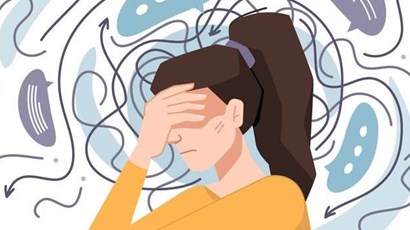Why do we find it comforting to re-watch our favourite movies?

Am I having a panic attack or a heart attack?
Although panic attacks and heart attacks have very different health implications, the symptoms can be surprisingly similar. How can you tell the difference between a panic attack and a heart attack?
Two unconnected but common health issues
Heart attacks and panic attacks are two unconnected health issues - the former is caused by a blockage of blood flow to the heart and the latter is a physiological response to stress. Yet, there is great crossover between the symptoms of a panic attack and a heart attack.
They are also both relatively common. Research by the British Heart Foundation (BHF) has found that heart attacks account for over 100,000 UK hospital admissions each year. It's also thought that one third of us will experience a panic attack at some point in our lives.
As people who experience a panic attack are overwhelmed with fear and worry, many misinterpret their body’s response to stress as signs they are having a heart attack. Unfortunately, this in turn triggers more stress and makes managing a panic attack much harder.
Harry experienced his first panic attack when he was 26: "The first time I had a panic attack, I seriously thought that there was a problem with my heart. I experienced chest pain and numbness in my fingers, and became so convinced that I was having a heart attack that it made my panic worse."
If in doubt, it’s important to seek emergency medical attention. While panic attacks can’t cause lasting physical damage, heart attacks can be fatal and emergency treatment may save lives. It's also worth noting that these shared symptoms might also indicate other serious conditions, such as a tear in the chest vessels, lung infection or collapse, or blood clots.
Shared symptoms of panic attacks and heart attacks
What is a panic attack?
A panic attack is a sudden and severe attack of fear and anxiety. Often, there is no obvious external trigger. Mental health charity Mind describes panic attacks as "a type of fear response".
It's important to remember that the physical symptoms of a panic attack do not indicate a physical problem. In fact, it's natural for our bodies to react in this way to stress or danger. For people who have panic attacks, the body's reactions are the same as if it were responding to an external threat. An overdrive of nervous impulses triggers adrenaline production and causes physical symptoms.
What is a heart attack?
Heart attacks, or cardiac arrest (myocardial infarction), are usually caused by coronary heart disease (CHD), a condition where deposits of cholesterol in the coronary articles rupture, leading to a blood clot which then blocks the flow of blood to a part of the heart muscle. A less common cause is a severe spasm or contraction of the coronary artery, which also stops the blood flow.
Heart attacks are life-threatening, and the sooner they are identified and treated, the higher the chances of survival. Studies have found that over 90% of people hospitalised after a heart attack survive - but getting help urgently is key.
Shared symptoms
The list of common symptoms that can affect people either experiencing a panic attack or heart attack is extensive:
- Palpitations (a pounding or racing heartbeat).
- Chest pain.
- Breathlessness.
- Feeling faint, dizzy, or light-headed.
- Feeling very hot or very cold.
- Sweating, trembling, or shaking.
- Nausea (feeling sick).
- A tingling or numbing sensation in the fingers or toes.
The differences between a panic attack and a heart attack
Different symptoms
While many symptoms are the same, it's worth noting that there are a few unique heart attack symptoms:
- Pain or discomfort in the jaw, neck, or back.
- Tingling, numbness, or pain in one or both arms or shoulders.
Thinking more specifically about the location and the type of pain and discomfort may also help to differentiate between the two conditions. While both panic and heart attacks cause chest discomfort, heart attack pain extends to other areas like the jaw, neck, arm, or back.
The pain can also feel different. In panic attacks, this is often sharp and stabbing, and chest discomfort is centred around the feeling of the heart racing. In contrast, during a heart attack it can feel like there is a pressure on the chest, a squeezing sensation, or an achy or burning feeling.
Can magnesium help with anxiety?
TikTok is full of claims over the health benefits of magnesium, including that it can help relie...
Different triggers
Panic attacks often appear to come from out of the blue. There may be certain emotional stress triggers that cause them to happen, but these aren’t usually obvious to onlookers or to the people experiencing the panic attack.
In contrast, heart attacks can be triggered by physical strain or exertion in individuals with underlying CHD. This is not to say that exercise isn't good for heart health. On the contrary, research has shown that:
- Regular physical exercise can significantly reduce your chance of heart attack.
- Personalised exercise plans are fundamental to a person's recovery from a heart attack.
Age and health
A person's health can increase their risk of having a heart attack. If a person has a history of heart attacks, or has diagnosed CHD, then it's likely that their symptoms are a sign of a heart attack. It's not uncommon for people to survive two or three heart attacks, and occasionally more.
Lifestyle factors such as smoking, a high-fat diet, and being overweight increase the risks of CHD and heart attacks, as do health complications like having diabetes, high cholesterol, and high blood pressure.
Age and sex are also significant factors, and many studies find that people over 40 years of age are at a much greater risk of having a heart attack, and that males are also more at risk than women.
As a result, a young person who follows a healthy lifestyle and who has no history of cardiovascular illness is far less likely to be experiencing a heart attack over a panic attack. This said, it should be noted that heart attacks can happen to young people and assumptions should not be made based on these risk factors alone.
Should I seek emergency care?
If you experience the shared symptoms of heart and panic attacks, and are worried that you may be having a heart attack, it's important to seek emergency medical attention. This means, in the UK, calling 999, regardless of your age or medical history.
Only after a full examination can a heart attack be ruled out, and a quick response from medical professionals can be the difference between life and death.
The exception is if you have experienced panic attacks before and are getting identical symptoms, which settle when you use techniques you've been taught (such as those below).
How to deal with panic attacks
It's common for people to experience multiple panic attacks. Panic attacks are a form of anxiety disorder, and can't be treated through emergency medical care. Panic attacks can't cause any physical damage beyond the physical discomfort of the symptoms, but the symptoms can cause great distress, and they may be eased by practising a few techniques.
Nicola Vanlint, psychotherapist and member of the British Association for Counselling and Psychotherapy (BACP), recommends the following:
Breathing exercises
"Breathe in through your nose and out through your mouth with your hands on your belly. Try to be aware of your belly rising and falling.
"Count steadily from one to five on each in-breath and each out-breath."
Vanlint advises people who have regular panic attacks to practise breathing exercises daily: these can help prevent attacks but take repeated practice.
Distraction
"Use your five senses. Find five things you can see, four things you can touch, three things you can hear, two things you can smell, and one thing you can taste. Sipping water can also help. It's easier said than done, but try to remind yourself that it will pass and the symptoms you're feeling are caused by anxiety," advises Vanlint.
These self-help techniques may prove effective, but like any medical condition it's best to seek professional help, especially if you continue to have regular panic attacks. Vanlint describes cognitive behavioural therapy (CBT) as "an extremely effective treatment for panic disorder".
Your GP will be able to advise you of all available treatment options.






